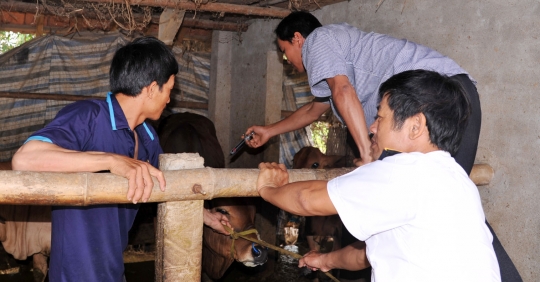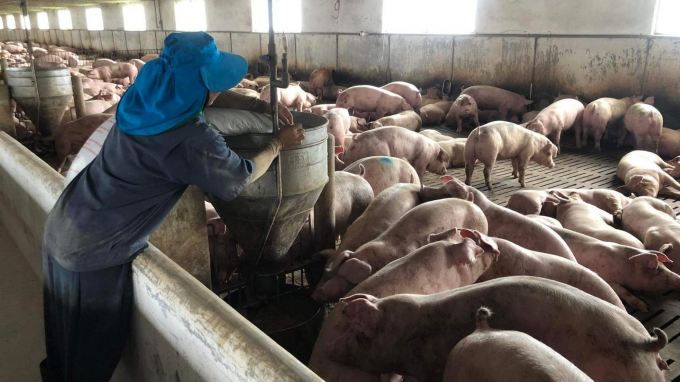
Since the beginning of the year, Phu Yen province has not had a dangerous disease in pigs. Picture: KS.
Cattle and poultry have not yet emerged as dangerous diseases
From the beginning of the year until now, the herd of 20 sows and 120 meat pigs of Nguyen Thi Nguyet family, Phu Thu Town, Tay Hoa District have kept their safety with diseases such as blue-eared pig, foot-and-mouth disease, and pneumonia.Therefore, the herd of sows has still giving birth since the beginning of the year and had meat pigs and sold 150 pigs.
Ms Nguyet says her pigs have survived all diseases for many years, including the African swine fever epidemic that raged in 2019, because her family raised the village. Specifically, starting in 2018, her family switched from small livestock farming to industrial agriculture and adopted biosecurity procedures, particularly strict adherence to vaccinations to prevent disease.
“From 2020 to date, the pig family has had no dangerous diseases in the herd, including African swine fever. Because the family of the pig herd has given a full preventive vaccination, only the African swine fever vaccine is not available, so the injection was not done. If there is a vaccine tomorrow, the family will definitely vaccinate the pigs to prevent and avoid economic damage,” Nguyet said.
In addition to full vaccination, Nguyet regularly actively cleans, disinfects and disinfects the entire barn to kill pathogens and adheres to the principle: the barn is always cool in summer, warm in winter. Therefore, pigs always grow and develop well. In particular, the fully active breeding method reduces input costs, making it more economical for her family to breed than to buy seed from outside.
“If the price of live pigs is about VND 65,000/kg, the family earns about VND 1 million/head. As for the current pig price of 53,000-54,000 VND/kg, the family only makes a small profit, if they buy breeders outside, there may be loss due to the high cost of feed,” Nguyet said.
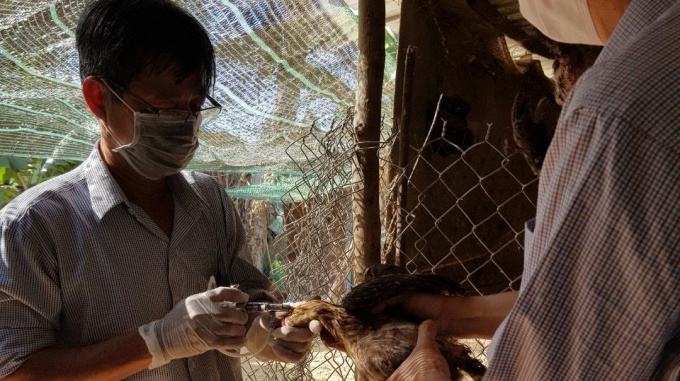
To prevent and control disease, farmers must actively vaccinate their chickens fully. Picture: KS.
Similar to Ms. Nguyet, Ms. Tran Thi My’s family’s Muoi Nghiep chicken farm in Hoa Hiep Bac District, Dong Hoa City, with a number of 15,000 to 17,000 chickens released each year, is always in a state of ensuring disease security from 2014 to now.
Ms. Tran Thi My said that the reason why her family’s cattle breeding is cheap and the loss rate is low (the rearing rate is 95%) is because of proactive disease prevention through vaccination of chickens.
“Most of my chickens are fully vaccinated with vaccines like cholera, gumboro, chicken pox, avian flu….
Especially when it’s hot, the family uses a fan to cool off, and when it’s cold, cover it with a tarp to keep the chickens warm so they don’t freeze and cause harm. During the rearing process, Ms. My’s family closely monitors the chickens to detect diseases at an early stage, promptly isolating and treating them to avoid spreading to the entire flock.
Ms. Tran Thi My said that her family has been raising chickens since 1998, but has been raising them on a large scale since 2004. In the past, her family’s chicken rearing was often unfavorable, most notably in 2013, around 8,000 chickens, both large and small, were completely harmed by bird flu because they were not vaccinated against the disease. With the lessons of this great loss, her family later followed recommendations to fully vaccinate chickens.
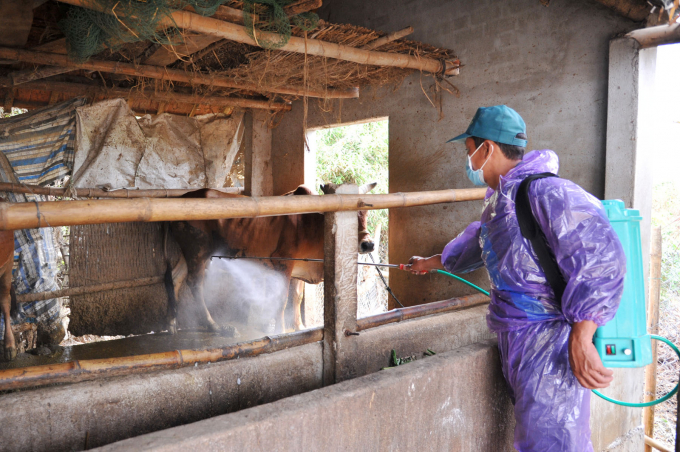
Cleaning, sanitizing and sanitizing livestock stalls is very important and helps limit disease. Picture: KS.
The weather is complicated, the risk of illness is high
According to Phu Yen Department of Livestock and Veterinary Medicine, from the beginning of the year to now, the situation of dangerous diseases in livestock and poultry such as foot-and-mouth disease, bird flu, African swine fever, skin rash… doesn’t happen in the area.
Common animal and poultry diseases such as classic swine fever, pasteurellosis, paratyphoid, New Zealand (chicken disease), gumboro… were recognized early on by the veterinary office and combated well.
Mr. Nguyen Van Lam, director of Phu Yen Animal Husbandry and Veterinary Subdivision, said that thanks to the veterinary system in the region, which works in a unified vertical line from province to district, favorable conditions should be created in the field of veterinary medicine epidemic prevention and control in livestock and poultry.
At the same time, the sub-department advised the Ministry of Agriculture and Rural Development to submit to the Phu Yen Provincial People’s Committee to issue an annual disease prevention and control plan, providing communities with antiseptic chemicals to organize disinfectant spraying and disinfecting all the fields livestock area.
Implemented vaccination in the first phase of 2022, with the results reaching 87% (105,000 animals/120,000 animals) for the prevention of foot-and-mouth disease and 98% for the vaccination against avian influenza… Currently, the industry sets Phu Yen Veterinary Medicine the second round of vaccinations in 2022 from September to November 2022.
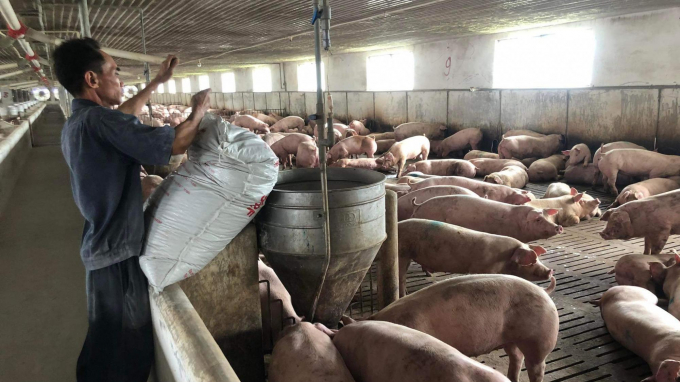
Industrial-scale pig farming in Phu Yen Province. Picture: KS.
The subdivision has instructed local livestock and veterinary stations to actively monitor livestock and poultry diseases, particularly in disease-emergent areas, high-density breeding areas, slaughter areas, etc. Animal trade. At the same time, strengthen the supervision and control of slaughter, veterinary hygiene inspection, quarantine work, control of the transportation of animals and animal products in and out of the province and transit through the province.
However, what Mr. Lam is concerned about at the moment is the weather in the area is complicated, hot and sunny during the day, with afternoon or thunderstorms leading to low temperatures and high humidity at night. This will reduce livestock resistance and create conditions for disease penetration into livestock, including aquatic products.
In addition, trade and transport activities increased in the last months of the year, making the probability of spread of diseases between provinces and cities very high, especially dangerous infectious diseases such as African swine fever, dermatomyositis, foot-and-mouth disease, avian influenza.
To respond, the head of the Animal Husbandry and Veterinary Medicine Subdivision of Phu Yen Province recommends farmers to take the initiative to implement biosecurity measures and regularly pay attention to hygiene, disinfection and sterilization twice a week.
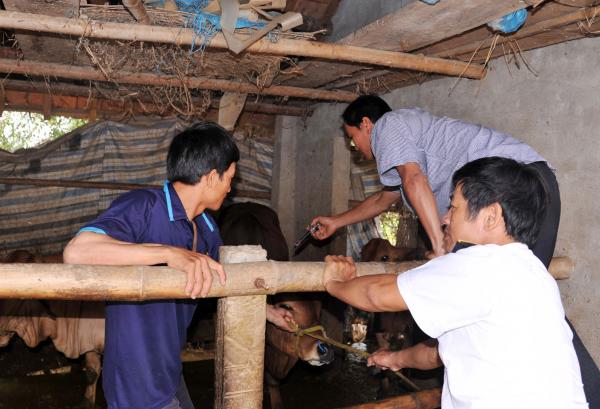
Veterinary services vaccinate cows in Dong Xuan district. Picture: KS.
At the same time, it is necessary to adequately feed livestock, increase vitamin and mineral supplements, especially fully vaccinated against diseases such as avian influenza, duck cholera, pasteurellosis, foot-and-mouth disease, etc. African swine fever, rash.. In addition, farmers need to clean, disinfect and kill insects, flies, mosquitoes, ticks … and take measures to keep animals warm to increase their immunity, resistance and disease control.
Breeders do not purchase or transport animals and animal products from disease-affected locations.
When importing breeds, breeders must comply with regulations such as B. Breeding animals of clear origin that are quarantined by the local government agency must be held in captivity and isolated for 15 days prior to import to monitor their health flock and must report to the local authorities in accordance with the provisions of the livestock law.
If they discover infected or dead livestock or poultry, they must immediately report to the nearest functional authority and are not allowed to sell sick or dead livestock or poultry.
According to Mr. Nguyen Van Lam, director of the Subdepartment of Animal Husbandry and Veterinary Medicine of Phu Yen Province, the municipality will continue to implement the project of restructuring the agricultural sector in the field of animal husbandry and livestock development strategy in Phu Yen Province in the period from 2021 to 2030 a vision by 2045. Accordingly, the province will develop animal husbandry in concentrated animal husbandry areas toward modernity, environmental protection, climate change adaptation and sustainable development, while maintaining the development of domestic economy toward industry.

